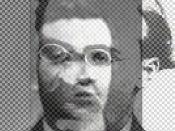Friedrich Wilhelm Nietzsche: Distinctive Philosopher and Contributor to Modern Philosophy of the Twentieth Century
"I know my fate. One day there will be associated with my name the recollection of something frightful- of a crisis like no other before on earth, of the profoundest collision of conscience, of a decision evoked against everything that until then had been believed in, demanded, sanctified. I am not a man. I am dynamite." Nietzsche said this about his own work in one of his most widely acclaimed essays, "Why I am a Destiny." Nietzsche did interpret his own fate accurately in the days when his genius mind was deteriorating rapidly eventually leaving him senile and ready for death. Though he was unread and insignificant during his own lifetime, Nietzsche's works extensively influenced revolutionary philosophers in the century to follow. From American theologian Paul Tillich to German philosopher Martin Heidegger, his works inspired thousands in their eternal search for an explanation of the psychological elements of life and beyond.
Considered to be one of the first existentialists, his convictions were completely original to his own distinctive mind, yet built and expanded upon by philosophers after his time. Probably one of the most critiqued and acclaimed theorists of all times, he is essential to modern philosophy.
Nietzsche's early life greatly shaped his ideas. He was born into a church-oriented family with clergy members on each parent's side of the family tree. His life was predetermined for him by his family, he was to be a clergy man as well. Nietzsche was sent to attend a first-rate boarding school called Schulpforta. There he began to study philology. Around the age of eighteen however, he began to explore philosophy intensively, and his faith suffered. He encountered Schopenhauer's World as Will and Idea. In response to Will...


